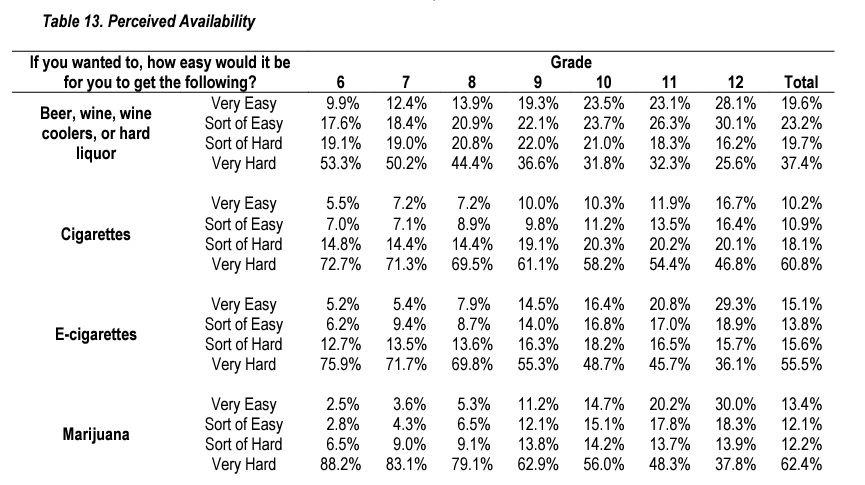Youth Substance Use Prevention Works: Why Enforcing Public Policy is Critical
Posted on
 April is Alcohol Awareness month, making now a great time to reflect on the causes as well as the effects of addiction. But to truly reduce the incidence of addiction in our communities, we need more than awareness—we need strong public policies aimed at preventing underage drinking and substance use.
April is Alcohol Awareness month, making now a great time to reflect on the causes as well as the effects of addiction. But to truly reduce the incidence of addiction in our communities, we need more than awareness—we need strong public policies aimed at preventing underage drinking and substance use.
Today, we know that 90% of individuals with severe substance use disorders begin using alcohol, nicotine, marijuana, or other substances before age 18. That’s why prevention efforts among youth populations are crucial for achieving successful long-term outcomes.
Why Prevention Policies Are More Important Than Ever
Substances Legal for Adults Are Widely Available
According to SERAC’s 2021-22 Youth Survey—which polled more than 7,000 students in grades 6-12 in Connecticut’s New London and Windham counties—young people consider alcohol to be the easiest of all controlled substances to obtain. 19.6% of respondents said it would be “very easy” to get alcohol, while 23.2% said it would be “sort of easy.” Following alcohol, the next “easiest to obtain” substances were e-cigarettes, cannabis, and cigarettes, respectively.

What do these substances have in common? They’re all currently legal in Connecticut for adult use. Whether teens get them from an adult with permission, take them from home without permission, or use a fake ID to purchase them, it’s clear that the wide availability of alcohol, cannabis, and tobacco contributes to underage use.
The Risk of Addiction is Highest for Young People
For young people, easy access to alcohol, cannabis, and tobacco can be a gateway into a long struggle with addiction. In the adolescent brain, pathways between regions are still developing; this ‘plasticity’ is the reason teens can learn new things quickly—but it also means the brain becomes easily habituated to drugs and alcohol. For instance, youth who start drinking before age 15 are 50% more likely to become alcohol dependent in adulthood, according to research from the National Institute on Alcohol Abuse and Alcoholism.
Substance use disorders exist on a spectrum ranging from mild to moderate to severe, and though a variety of treatment approaches offer pathways to recovery, this is a lifelong disorder. Even substance use that doesn’t develop into severe addiction can have major long-term impacts on a person’s physical and mental health. Irreversible changes to the brain can also translate into reduced academic, athletic, and career performance, as well as social and legal problems. It is far easier and more effective to prevent these complex issues than it is to resolve them, which greatly underscores the need for public policies aimed at preventing underage substance use entirely.
The Economic Impacts of Addiction Continue to Rise
Unfortunately, the effects of addiction also radiate beyond the individual, carrying heavy societal costs as well. “Substance abuse clearly is among the most costly health problems in the United States,” noted a 2008 report from the Substance Abuse and Mental Health Services Administration (SAMHSA)—and the problem has further increased in the 15 years since then. Today, substance misuse takes an economic toll on society of hundreds of billions of dollars per year. This includes health care costs, lost productivity, lost potential earnings, criminal justice costs, and lost goods and services for responding to substance-related accidents and fires.
However, SAMHSA’s review found that school-based prevention programs can be cost-effective on a massive scale by delaying young people’s first instance of using one or more substances, and in some cases preventing them from ever engaging in underage use. When the projected cost savings to society were looked at against the costs of administering these prevention programs nationwide, it was clear that the programs would quickly pay for themselves.
Preventing Sales to Minors
Under Connecticut law, it is prohibited to sell or deliver alcohol, tobacco, and cannabis to minors, and retailers who violate these laws face steep penalties. Those who sell tobacco products to a minor may be fined up to $300 for the first offense, and up to $1,000 for each subsequent offense (C.G.S. Sec. 53-344). Alcohol retailers in violation of the law can be charged with a Class A misdemeanor, punishable with fines up to $2,000 and up to a year in jail (C.G.S. Sec. 30-86). These latter punishments now also apply to those who sell cannabis to minors, as the state’s recent Public Act 21-1 aligned the prevention of underage sales for both substances.
But these penalties are not enough to completely prevent underage sales. To help enforce this policy at liquor stores and cannabis dispensaries, both state and local agencies perform random, unannounced compliance checks, sometimes using an underage decoy attempting to make a purchase. Reports show that in 2019 (the most recent year for which data is currently available), approximately 140 liquor store compliance checks were conducted; of these, nearly one-quarter (about 30 retailers) failed. The state collected approximately 135 fines and issued 75 temporary license suspensions.
If you are the owner of a Connecticut cannabis dispensary or retail store where alcohol or tobacco products are sold, be proactive in preventing underage sales. Ensure you have a written policy that includes when to check ID as well as what forms of ID may be accepted. Go over the policy with your staff frequently, train them on age verification techniques, and have them role-play refusing a sale when necessary. Your compliance with the law not only protects your business, but also helps to keep your community safer.
Preventing Substance Use at Home: CT’s Social Host Law
While there is still ample opportunity to strengthen Connecticut’s ban on underage sales, studies show that liquor stores are not the leading source of alcohol for young people today. SERAC’s 2021-22 Youth Survey found the most commonly reported source of alcohol to be parents, with permission (50.4%) followed by other adults, at parties, with permission (39.5%).
Connecticut’s Social Host Law aims to change that, holding homeowners, parents, guardians, and landowners accountable for underage substance use right where it occurs. The law makes it a Class A misdemeanor to allow underage drinking or cannabis use in your home or on your property—regardless of whether you were present at the time, whether you purchased or supplied the alcohol or cannabis, and even whether you planned the party or gathering. Even hosts under age 21 themselves could be charged under the Social Host Law.
Laws designed to prevent youth substance use in Connecticut have already shown success, but there is still much work to be done. Strengthening community awareness of the problem—and our policies—is only piece of the puzzle. Comprehensively addressing this issue will require increased enforcement of current laws, increased funding for prevention programs, and constant vigilance of substance use trends among teens and adolescents. Investing in underage substance use prevention is well worth the cost, as it makes both our state and our citizens healthier and safer in the long-term.
